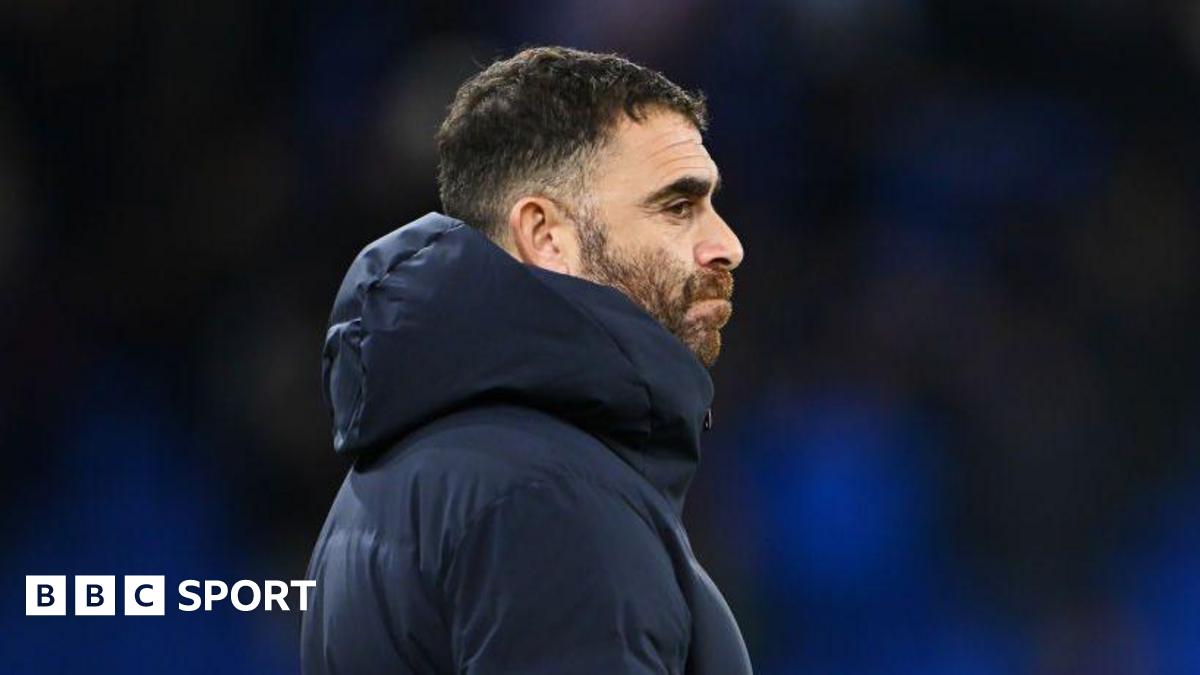Ange Postecoglou’s Tottenham reign has been a wild ride of euphoric highs and painful lows. Now, after a disappointing run of results, we ask whether he can turn it around in N17.
Ange Postecoglou’s philosophy has never faced so much scrutiny.
He is steadfastly committed to his way of playing, eschewing pragmatism in the name of entertainment, and with recent results poor, the Tottenham manager’s refusal to adapt is coming under the microscope.
Sunday’s 4-3 defeat to Chelsea, the second time in his two home meetings with the Blues that Postecoglou’s Spurs have gone ahead after a fast start but ultimately conceded four goals and lost.
In last November’s defeat, it was Postecoglou’s high line that drew a great deal of attention. Despite going down to nine men, the Australian insisted his defence remain as high up the pitch as possible, leaving acres of space in behind even though they didn’t have enough players to put pressure on the ball. Nicolas Jackson and Raheem Sterling ran riot, racing in behind time and again, and although the game ended 4-1, it could have been much more. Afterwards, Postecoglou told reporters asking about that high line: “It is just who we are, mate. If we go down to five men, we will still have a go [playing a high line].”
A year on, and it is Tottenham’s relentless pressing and Postecoglou’s insistence on sticking to Plan A whether they are winning, drawing or losing that is frustrating supporters.
Last Sunday, Spurs started brilliantly and raced into a 2-0 lead inside 11 minutes. It was the earliest Chelsea had been two goals down in a Premier League game since December 1996.
There was to be no let-up from the home side. Postecoglou wanted more of the same and lots of it. It was that approach that saw them win 4-0 at Manchester City last month rather than sitting on their two-goal first-half lead.
But the truth is they rode their luck in that game. Erling Haaland had an off day in front of goal and Spurs goalkeeper Guglielmo Vicario had a very good one. Spurs’ xG (2.51) was only slightly higher than City’s (2.14), suggesting the game was nowhere near as one-sided as the final score suggested. City led the xG race until Brennan Johnson’s 93rd-minute tap-in.

Against Chelsea, they were punished for continuing to press high after going 2-0 up, unable to maintain the intensity that had caused so many problems in the game’s opening stages. Moments after Chelsea played through a half-hearted Spurs press, Jadon Sancho pulled one back as the hosts began their gradual collapse.
Tottenham make more runs with intensity and press more than anyone else in the Premier League. They rank first among all 20 teams this season for sprints (180.7 per game), pressures in the final third (83.1 per game), off-the-ball runs to try and receive a pass (172.9 per game), sprints to try and receive a pass (59.4 per game), and overlapping runs (33.6 per game). The average distance of each of their off-the-ball runs is longer than that of any other team (22.1 metres per run).
When it works, it can be devastating. The 4-0 win at City was one of the high points of Tottenham’s recent history. That was the seventh game in which they have scored 3+ goals this season alone. There’s no questioning that when they are good, they are up there with the best teams in the country.
But as Tottenham have found this season, the problem with playing with quite so much intensity with a Europa League campaign added into the schedule is that there are too many games to play precisely that way for 90 minutes twice a week, every week. And to play with that intensity, you have to train with just as much, too.
It is no coincidence that Spurs have lost three and drawn one of their last four Premier League games immediately after playing in the Europa League on the Thursday. And Sunday’s capitulation to Chelsea came after a Thursday-night loss at Bournemouth in the league.
Tottenham just haven’t been able to play perfect Postecoglou football for full games week on week. And when the intensity of their out-of-possession game drops off, they aren’t able to overwhelm opponents like they do at their best and, in truth, they become too easy to play against. Sancho’s goal was a very good strike, but it was very easy for Chelsea to get up the pitch for that goal.
The frustration for many Spurs fans is that Postecoglou will not even entertain changing how his team play, even when two or even three goals to the good – situations when most other teams would be more cautious. “It [our style of play] was good enough to get us ahead in the game so I am not sure why we should change our approach,” he said when quizzed on the subject after the latest Chelsea defeat.
It’s a self-perpetuating problem. The more they run, press, and harry, the more tired they get. And the more tired they get, the less they can run, press and harry.
Spurs’ intensity isn’t limited to their out-of-possession approach, either. After the ball goes out of play – for a corner, free-kick, goal-kick, throw-in or penalty – they restart games quicker than every other team in the league, taking just 23.7 seconds on average.

And what’s more, they barely change their approach whether they are winning, drawing or losing. They delay games when losing by an average of 22.4 seconds, compared to 22.0 seconds when drawing, and they only delay games marginally when winning, taking 27.0 seconds to restart the game.

Their quick restarts from goal-kicks have caused them a few problems this season, particularly in periods when they are under consistent pressure as the opposition are pushing for a goal to get them back into the game.
Spurs take an average of 17.3 seconds to take a goal-kick when they are winning, which is by a distance the quickest in the Premier League this season, and more than twice as fast as 12 of the 19 other teams. Newcastle and Manchester United take more than 45 seconds for each goal-kick when they are ahead.
But Spurs only take 2.2 seconds longer to take a goal-kick when they are winning than when they are losing (15.1 seconds) – the smallest difference in the Premier League this season. That is, when they are ahead, there is almost no attempt to run down the clock. They get the ball back into play almost as quickly as they do if they are behind.
The thinking here is clearly to maintain intensity; to not allow the opposition a chance to get back into shape; to keep the pressure up with a suffocating relentlessness; to play quickly enough that the opposition aren’t ready to defend.
But by restarting so quickly when the opposition are searching for a goal, Spurs invite more pressure, and in turn don’t allow their own players a break. There have been more than a few occasions when Spurs have got the ball back into play quickly, only to have to play back to their goalkeeper who, under pressure from opponents, kicks it long up the field within a few seconds of taking it short in the first place.
This causes particular problems for the full-backs, who have to get high up the pitch quickly to get into position in Tottenham’s in-possession shape, but have to sprint back to defend again as soon as the ball is lost. Spurs play with their full-backs higher up the pitch than any other team in the league aside from Manchester City.

Postecoglou would argue that the positives outweigh any negatives, and any instances of his approach working instantly make his philosophy worth going all in on. That is a reasonable opinion, and one he is clearly going to stick by, but doubts are creeping in among the fans, and as soon as the players’ belief starts to waver, there’s no chance of it working.
The intensity of Spurs’ game is also having other adverse effects. For a second season in a row, they are enduring a terrible injury crisis, with hamstring injuries – the injuries most commonly associated with being overworked – making up a significant proportion of their absences.
They have lost Ben Davies, Micky van de Ven, Son Heung-min, Richarlison (twice) and Wilson Odobert (twice) to hamstring injuries this season. According to premierinjuries.com, those make up 44% of the injuries suffered by Tottenham players this season (only looking at injuries that have caused the player to miss at least one game). Across the entire Premier League in 2024-25, 24% of all injuries have been hamstring-related, putting Spurs well above the league average.
And on Thursday, Postecoglou confirmed that Van de Ven was set for another spell on the sidelines after aggravating his hamstring injury in the Chelsea defeat.
It would be unfair to solely blame Postecoglou for Spurs’ injury issues, but he also isn’t entirely blameless. He admitted while after a spate of hamstring injuries during his time at Celtic that his style of play can be “difficult to adjust to”, while also saying in the same breath he would never “compromise the football team we want to be” even if that means “some casualties along the way.”
With injuries threatening to derail Tottenham’s season, there is arguably more reason than ever before for Postecoglou to take a more pragmatic approach.
The chances of that are very, very slim, though. The Australian is convinced that nothing but total commitment to this way of playing is what is required. He is getting increasingly riled by anyone questioning his approach, too, which seems to only make him more likely to double down.
“Look, I don’t know how many ways I can say this,” Postecoglou railed late last month. “There’s plenty of room for pragmatism in walks of life and in football as well. But I’m just not interested in it. I don’t know why I need to change my approach to be like everyone else wants me to be.
“I’ll continue to push this team to be a bit different, to play football in a different way, and maybe when I’m long gone you’ll all pine for my entertainment, and you’ll have had your fill of pragmatism.”
There are very few managers who have succeeded at the top of the game with such an idealistic outlook on football. Most have learned to adapt when absolutely necessary.
That is not to say that this can’t work for Postecoglou at Tottenham, but for now, it certainly isn’t. Either he will need to change, or the club will need to afford him a level of patience that many fans would not sanction.

Enjoy this? Subscribe to our football newsletter to receive exclusive weekly content. You can also follow our social accounts over on X, Instagram, TikTok and Facebook.









